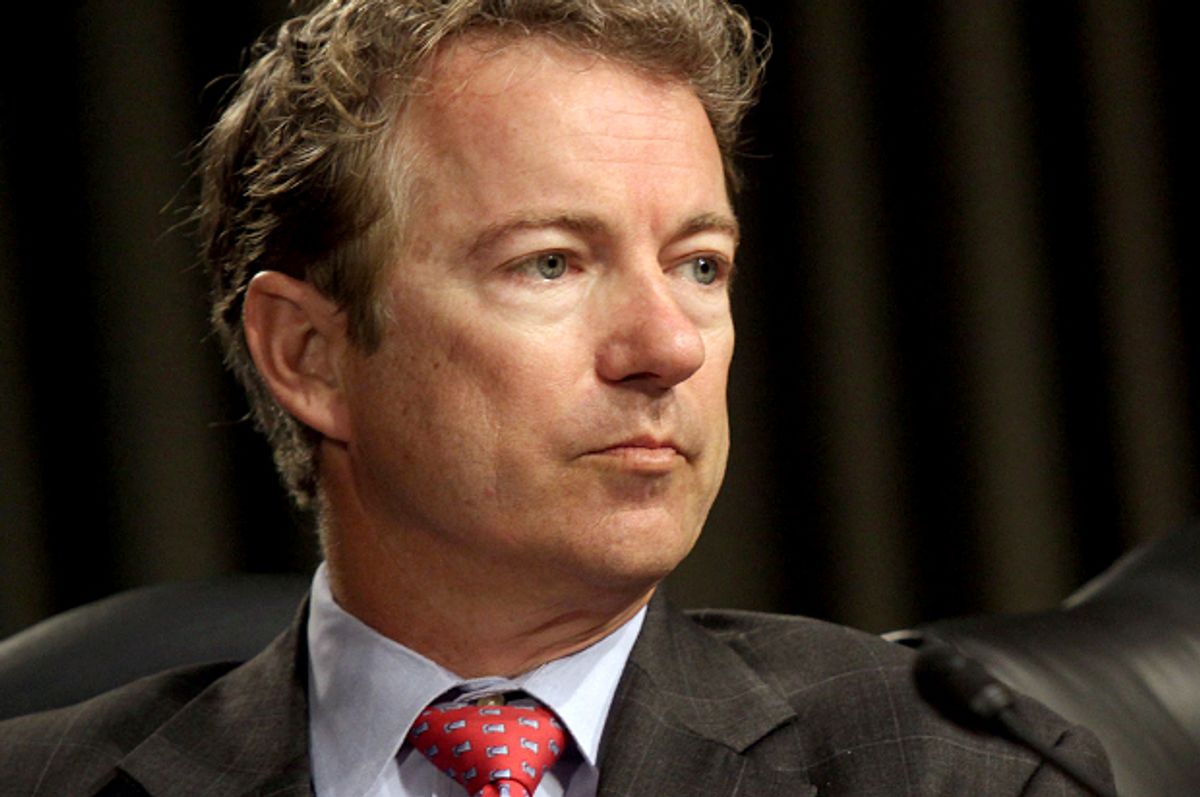Of the many terrible Republican responses to Barack Obama’s state of the union address Tuesday night, Rand Paul’s was hands-down the worst. Standing in a dimly lit and sparsely adorned office, the Kentucky Republican rebutted the president’s upbeat and optimistic speech by slogging through an awkward and rambling monologue about how the country is going down the toilet. “I wish I had better news for you,” Paul began, opening his remarks as if he were delivering a cancer diagnosis, “but all is not well in America.”
Prevailing upon his background in medicine, Paul sketched out a governing vision that aligns with medical ethics. “As a physician, I was taught first, do no harm. To think before you act. To analyze the unintended consequences of your actions. I think America would be better off if all of our politicians took the same approach. First, do no harm.” And what’s the very first policy Paul recommends as part of this “do no harm” philosophy? A wildly destructive and needlessly harmful balanced budget amendment:
PAUL: It’s self-evident that the president and Congress are unable to do what every family in America must do: balance their budget. If Congress cannot, or will not, balance the budget, then we should amend the Constitution to make it mandatory.
A balanced budget amendment is a great way to pander to voters and make it seem like you stand for fiscal responsibility. Who doesn’t love a balanced budget? It’s what every single family does! Hooray for families! However, despite the incessant scolding of centrist pundits, the government is under no obligation to balance its budget. More to the point, imposing that obligation will have hugely negative effects on the economy – precisely the sort of “unintended consequences” that Dr. Rand Paul wants Dr. Government to avoid.
The reason a balanced budget amendment is such a bad idea is that it handcuffs the federal government, providing it little flexibility to respond to shifting economic conditions. With no option but to robotically seek a balanced budget, even in times of economic distress, such an amendment would force the government into a series of horrible economic policy decisions. The Center for Budget and Policy Priorities made this danger plain back in 2011 when congressional Republicans – Rand Paul among them – were pushing hard for just such an amendment:
When the economy slows, federal revenues decline or grow more slowly and spending on unemployment insurance and other social programs increases, causing deficits to rise. Rather than allowing the “automatic stabilizers” of lower tax collections and higher unemployment and other benefits to cushion a weak economy, the amendment would force policymakers to cut spending, raise taxes, or both. That would launch a vicious spiral of bad economic and fiscal policy: a weak economy would lead to higher deficits, which would force policymakers to cut spending or raise taxes more, which would weaken the economy further.
“Whatever,” you deficit fetishists may scoff, “that’s just the opinion of a bunch of snooty liberals at the liberal CBPP.” Fair enough. Here’s the American Enterprise Institute’s Jim Pethokoukis on why balanced budget amendments are “not a great idea.”
Again, why do we need to actually balance the budget at all, much less ASAP? Ryan’s original “Roadmap” plan, for instance, lowered the debt-to-GDP ratio by 30 points over two decades without a single year in the black. Of course, running surpluses would accelerate the process. But keep in mind how difficult America’s aging population will make it to cut spending.
And here’s National Review’s Ramesh Ponnuru:
The senators’ amendment would make the federal government a smaller share of the economy than it has been since the 1950s. The chief economic argument against it is that it would make recessions worse. When recessions hit, they increase deficits: Revenue falls while spending on unemployment benefits (among other things) goes up. A strict balanced-budget rule would force spending cuts or tax increases at times of economic weakness. The Federal Reserve could theoretically offset these effects, but you’d want to be pretty confident beforehand that it would do the right thing.
Left, right, center – there’s a fairly broad agreement that amending the Constitution to mandate a balanced budget would be a destructive policy choice made in the pursuit of illusory benefits. To follow through on Rand Paul’s medical analogy, the balanced budget amendment is a dangerous quack remedy aimed at curing a minor ailment, akin to treating a headache with bloodletting and arsenic.

Shares